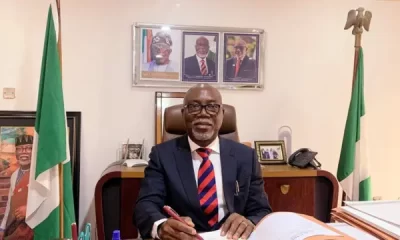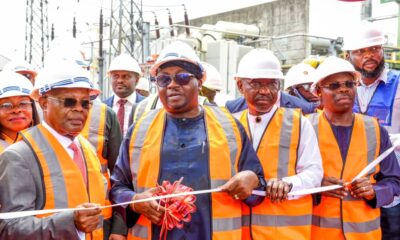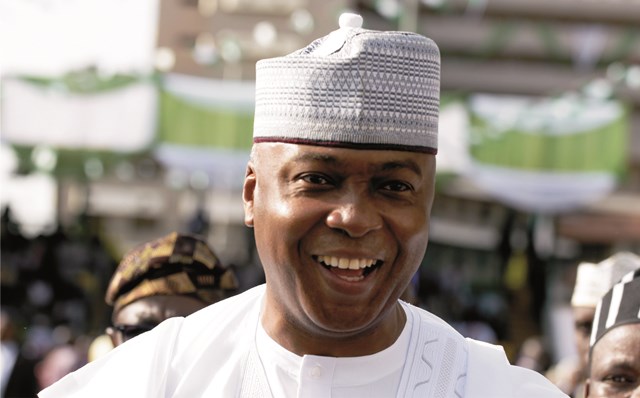Opinion
What Hope For Nigeria’s Energy Generation?
I can not forget in a hurry that when the National Council on Privatisation constituted and empowered a 23-member Electricity Sector Reforms Implementation Committee (ERIC), the committee was charged with the responsibility of developing guidelines for promoting the policy goals for total liberalisation and competition. It also had the task of promoting private sector-driven growth of the electricity sector. Of course, whenever private sector participation becomes imperative, it is an indication of a gap calling for a bridge. If as posited by Okoro and Chikuni (2007), constant power supply is the hallmark of a developed economy, it implies that our nation whose energy need is epileptic in supply, will not only be prolonging her development, it also risks losing potential investors.
The realisation of this fact, I supposed, became a strong justification for the power sector reformation efforts in Nigeria, which culminated in the signing into law of the Electric Power Sector Reform Act, on March 11, 2005, by the then President and Commander-in Chief of the Armed Forces of the Federal Republic of Nigeria, Chief Olusegun Obasanjo. Ever since, several policies have been put in place by successive administrations to strengthen the sector for enhanced productivity, and probably actualise the federal government’s target of achieving a whopping 20GW of available electricity capacity by the end of the year 2020.
That was exactly the beginning of the unbundling of the Nigerian power sector. The eventual loss of the monopoly of the Nigerian Electricity Power Authority (NEPA) over the operation of the Nigerian power sector in 1998 was testimonial of the effort of the committee in this direction. while the administration of former president Muhammadu Buhari lasted, there were insinuations and proclamation specifically by the then Vice President, Yemi Osinbajo, that the federal government’s power sector reforms were already yielding results, stating that steady progress was being recorded in power generation, transmission and distribution capacities on the national grid.
Osinbajo, who said this at the commissioning of a 2x60MVA, 132/33KV substation and associated 132KV transmission lines in Abeokuta, Ogun State, viewed the substation and transmission lines, built by the Niger Delta Power Holding Company (NDPHC) and the Transmission Company of Nigeria (TCN), as an important part of the President Muhammadu Buhari-led administration’s efforts to improve the supply and quality of power reaching the homes and businesses of Nigerians.
He asserted that Nigeria at that moment had 13,427 MW of installed capacity, and an available capacity of 8,342MW, an achievement he attributed to the efforts of their government – private sector partnership in the rehabilitation/commissioning of turbines in Shiroro, Egbin, Delta Power, Sapele, and Gbarain. In his expression of high optimism, he assured of a new generation of energy in the tune of Gbarain (Extra 115 MW); Kashimbilla (40 MW); Afam III Fast Power (240 MW); Gurara (30 MW); Dadin Kowa (29 MW); and Kaduna (215 MW).
What that suggested was that in the long term, several solar plants would come on stream because, as he asserted, the national grid had the capacity to transmit 7,000 MW, supposedly an increase from less than 5,000MW in 2015, following the completion of several transmission projects like the Ikot Ekpene switching station and the completion of the Ikot Ekpene-Ugwuaji-Makurdi-Jos loop done by the (NDPHC) in 2017..
Of course, as a key stakeholder in both urban and economic development, nothing short of a vote for the private sector involvement could be apt at this moment in the country’s power sector, given its place as a major contributor to national income and the principal job creator and employer. With the number of both electricity generating and distribution companies now operational in the country’s power sector, one still lacks explanations to why the federal government’s target of 20GW of available electricity capacity by the end of the year 2020 could not still be actualised in 2023 or has that been achieved, waiting for distribution?
If so much effort as we were made to believe had been geared towards the realisation of the past federal government’s target of 20GW of available electricity capacity by the end of 2020, could it be wrong to expect stability in the power sector in 2023? That at this point in time, inclusion of the purchase, fuelling and maintenance of electricity generating sets across ministries, departments and agencies in the country, is still given prominence in our budget proposals, leaves much to be desired
Like former president, Olusegun Obasanjo, once said “if we insist that our economy is expected to join the world’s twenty largest economies in GDP size, then the electricity issue must be considered the top most of priorities”. This writer belives that if we fail in this sector, we can as well bid farewell to any aspirations towards joining the world’s twenty largest economies in GDP size. If the achievement so recorded in power generation by the past administration as announced by former Vice President Osinbajo, could be taken for real, why is the country still plunged into darkness; could it be that we generate without distribution?
I think the leadership of this great nation would be doing a great disservice to the led if it continues to place high premium on generating sets instead of looking for ways to distribute the energy so generated.
By: Sylvia ThankGod-Amadi
Opinion
AI And Transformation of Nigeria’s Education
The increasing advent of technology is slowly, but evidently taking over major sectors in the world today, but not so much in Nigeria. Education is the backbone of any country, especially if it is one that hopes for the better future of its youths and the growth of the country at large.
Despite the known fact that education is key to national development, Nigeria’s education sector seems to be buckling under pressure ranging from a limited access to quality learning resources, poor school infrastructure, and overcrowded classrooms, among others.
It does not end there as many educators lack the digital literacy to properly use these tools. Proper strategies, digital literacy training and a focus on providing proper infrastructure in schools are the barriers that need to be tackled to surmount this challenge. Addressing these issues first would pave way for Artificial Intelligence (AI) integration in schools.
Though, AI is more than technical jargon, it just might be what Nigeria needs to level the playing field, especially since it looks like we are being left behind with all the innovation technology has brought along. With its personalised features, teachers can tailor lesson plans based on each student’s weaknesses which would positively affect learning outcomes. Imagine a school in Kano, where students learn English through AI-powered applications and resources. It would give better opportunities for the teacher to have more time to give them more personal attention.
However, to fully realise these benefits, there are certain underlying issues that AI can easily tackle, especially those in rural areas, where there is lack of electricity, proper ICT tools, and internet connectivity.
A United States based publication, EdTech, noted that there is an increasing strain in the ability of teachers to carry out their occupational demands with planning lessons, meeting parents and guardians, and other administrative responsibilities.
However, according to Carnegie Learning, teachers who have embraced AI have seen notable changes in students’ outcome and their work flow. In their research, 42 per cent found out that using AI reduced time spent on administrative duties, 25 per cent noted that AI was particularly useful in assisting with personalised learning, and 18 percent of them reported an increase in students’ engagement. Only one percent could report no change at all with the use of AI in the classroom.
Notably, the United Nations Educational, Scientific and Cultural Organisation (UNESCO), highlighted the potential of AI to address challenges in education, and its ability to innovate teaching and learning, as long as it is deployed safely and ethically. This connotes that every good innovation has a negative downside, and Artificial intelligence is not without.
According to UNESCO, well thought out strategies to maximise the use of AI in classrooms is what our education sector needs. I believe that as a nation we need to set policies that are channelled towards AI integration into the education system, and more importantly, all hands should be on deck to facilitate its process.
Teachers as well as students have a role to play in ensuring that it is not misused and rendered a vice. If we do not integrate AI soon enough, the learning gap between Nigeria and other nations will continue to widen, as it is already the case for most sectors of the country. This gap would not only widen, but it would go on to affect our youths who will be left behind in the global workforce.
Though, schools are known to be institutions of socialisation, where teachers play a major role in shaping the minds and outlook of the students in the classroom, I do not see AI as a replacement for teachers and evidently cannot take the job of educators. Additionally, the World Economic Forum noted that while AI can enhance the learning processes, it cannot replicate the human element that is needed by every student – that which is provided by teachers.
Therefore, AI is not a threat to teachers; rather it is a partner that benefits not just the teachers, but the students as well. It is important that policy makers move to develop and implement policies that integrate AI into the education system in Nigeria. The earlier we embrace this innovation, the better it will be for the future of every child.
Eniola Shobiye
Shobiye, a student, writes from the University of Ilorin.
Opinion
Managing Eco-Space Of Terrorism In Nigeria
Terrorism simply refers to use of coercion, threat or to utilise violence to spread fear so as to attain political and sometime ideological goals.
Primarily, it involves criminal activities, use of war, manipulating the subconscious to influence policies or change political arrangement.
Culprits of terrorism often hide under the guise of religion to unleash mayhem as well as adopt kidnapping, assassination and outright killing of unbelievers to subdue them to commit the authorities to accepting their candidates in political parties.
There are also cases where late settlers use violence and war, to grab land to expand their territories or hold on to power in the political hemisphere.
Perpetrators, sponsors and supporters may use gorilla war tactics where there is no direct physical battlefield or war front.
This makes it absolutely difficult for security to use conventional tactics to combat it.
Thus, where terrorists use soft targets to harm innocent citizen where perpetrators mix with civilians and making it difficult to identify them.
Examples abound in the South-American state of Cuba by Fidel Castro, United Kingdom, Soviet Union, Africa and Nigeria in particular.
There were stories of Boko Haram’s removal of President Goodluck Jonathan in 2015, kidnap of Chibok School Girls, herdsmen and farmer clashes and today outright land-grabbing.
In Nigeria today, what started as a small crime of Boko Haram has grown into a holocaust and genocide.
From Northeast to Northwest, North Central, South West, East and South-South, terrorism has become a national phenomenon.
Only recently, the invasion and killing in Plateau and Benue States are still very fresh in Nigeria.
In Plateau State alone, about one hundred persons were killed in the State; prompting Governor Caleb Mutfwan to declare a restriction of movement of cattle and ban on the use of bicycle and tricycles within the hours of seven O’clock in the evening to six in the morning, among others.
Governor Caleb Mutfwan also added, “we are also reactivating community based response system while urging traditional leaders and youth associations to reactivate local vigilante.
In Benue State, Governor Hyacint Allia disclosed that more than 70 persons have been killed.
While investigation is still ongoing survivors of the mayhem disclosed that the suspected killers spoke Fulani related languages.
Benue State seems to be definite on the origin of the killer invaders. In fact, governor Hyacint Allia stated in a media chat, foreigners are among the herders that invade Benue to kill; adding that they hide in the bush and unleash mayhem.
Former Senate president, David Mark, said the attack was not ordinary but an organised and premeditated.
It is a matter of concern that no culprit has been met with consequences. No culprit has been brought to justice in a nation where this magnitude of killing has taken place. One may ask what can the State governor do when the security apparatus are on the exclusive list?
Even though the State governors collect huge amount of security votes monthly, and vigilante groups in form of Neigbourhood Watch are not permitted to work with guns. In this case, how can community effort function effectively?
Time has come to examine the entire eco-space within which the narrative of terrorism works.
It is, therefore pertinent for Nigerians, from north to south, to be definite and categorical in tackling the menace of terrorism in Nigeria.
To this end, the National Assembly must initiate a bill to decentralise security as communities cannot challenge or stand terrorists with bow and arrow.
Cattle rearing is a multi-million naira venture undertaken by prominent Nigerians who must register their businesses and addresses of their ranches.
A live cow cost about a million naira and therefore it may be unwise to allow voracious cattle to feed on crops of a humble farmer.
Similarly, the ECOWAS protocol on open grazing must be reviewed, as it is outdated, to disallow cattle wander from land to land in the name of open grazing.
Politicians and political office holders must declare their assets to indicate whether they have cattle and if so, their ranches.
This is because there is animal husbandry in developed economies operated as business and not as terrorists. Why should the case in Nigeria be different? Fighting terrorism should not be seen as a battle for soldiers alone.
States must fulfil their promises to terrorists granted amnesty and also tame the excesses of the so-called repentant culprits who renege on their vows to curb internal crises.
The narrative that the murderers are foreigners does not hold water.
Nigerians are tired with several meetings with service chiefs without any positive outcome.
Once again, the call for state policing has become more relevant and use of non-kinetics measures, should be granted renewal impetus. The challenge of out-of-school children must be tackled to avoid being used as ready market for recruitment of youths and child-terrorists.
The Nigerian president Bola Ahmed Tinubu should not shift blame by tasking State governors to look inward. Why is he commander-in-chief of the armed forces. Accountability, justice and honesty remain key to addressing and managing the eco-space of terrorism in Nigeria.The time to act is now.
Baridorn Sika
Sika is socio-political analyst.
Opinion
Averting Bunkering Crisis In Okrika
The illegal practice of bunkering has not only threatened our environment but also poses significant social and economic challenges to our residents. It is imperative that we call attention to this troubling issue and seek immediate action from the government to protect our community and restore order.
Bunkering, which is the illegal siphoning of crude oil from pipelines, has become an increasingly prevalent issue in the Okrika community. While those who engage in these activities may perceive them as a quick source of income, the long-term consequences for our community are devastating and far-reaching. The environmental impact cannot be understated; spills and leaks from bunkered oil, contaminate our land and water sources, seriously endangering and damaging the traditional fishing practices that have sustained our families for generations.
Fishermen, who have historically depended on the bountiful waters surrounding Okrika, are witnessing lessening fish populations as a direct result of pollution caused by bunkering. Many families who depend on fishing for their livelihoods are now struggling to provide for their loved ones, leading to increased poverty and economic instability. Moreover, the social effects of illegal bunkering are equally distressing.
The increase of illegal activities linked to bunkering fosters a culture of violence and crime, significantly undermining the safety and security of our residents.
There have been reports of violent clashes between rival groups, cultists fighting for control over illegal bunkering routes which have become alarmingly frequent, instilling fear and uncertainty among community members. Additionally, the lure of quick money from illegal bunkering has led to increased involvement of younger people compromising their future and perpetuating a cycle of poverty and crime that is difficult to break.
Despite the situation our community faces, it seems that government intervention has been insufficient. Local and federal authorities must take immediate and proactive measures to terminate this illegal practice and protect our community from its destructive consequences. Firstly, there needs to be a comprehensive crackdown on bunkering operations. This requires not only increased surveillance and policing of affected regions but also a robust collaboration between security agencies, community leaders, and local stakeholders. It is essential to dismantle the networks that facilitate these illegal activities and bring those responsible to justice.
Moreover, the government should invest in community awareness programmes to educate residents on the severe dangers of bunkering, informing them about the environmental risks, legal consequences, and health hazards associated with this practice. Such educational initiatives could empower community members to resist the temptation of engaging in illegal activities and help cultivate a culture of responsibility and protection for our environment.Alongside these efforts, significant measures should be taken to restore and rehabilitate the environment. This includes thorough cleanup initiatives in areas affected by oil spills and ongoing pollution, as well as long-term environmental restoration projects to recover the damaged ecosystems that sustain our community. Furthermore, the government needs to provide support and assistance to local fishermen and businesses adversely affected by the damage caused by bunkering. Initiatives such as grants, low-interest loans, and technical training programmes can help families regain their footing economically and help restore their livelihoods.
The issue of bunkering in Okrika is not merely an environmental concern; it is an urgent social and economic crisis that demands our collective attention and response. I implore our government representatives to take decisive action to protect our community, rehabilitate our environment, and ensure a brighter future for the residents of Okrika. We must work together, steadfast in our resolve to combat this menace and create a safer, more prosperous community for generations to come.
Together, we can seek solution to alleviate this crisis, restoring hope and opportunity for all, both the indigenous and non-indigenous people in Okrika.
Grace Thompson
Thompson, an intern with The Tide, resides in Port Harcourt.
-

 Politics3 days ago
Politics3 days agoTribunal Dismisses PDP, Others’ Petitions Against Aiyedatiwa’s Election
-

 Politics3 days ago
Politics3 days agoDSS Seeks Court Injunction Against Publicity For Utomi’s Shadow Govt
-
Sports3 days ago
Tinubu Assures Kano Crash Survivors Of Rehabilitation
-
Rivers3 days ago
LG Administrator Commits To Completing Ongoing Projecrs … Urges Students Of The LGA To Be Focused
-

 Featured3 days ago
Featured3 days agoTinubu Commissions Afam 11 Power Plant …Urges Stronger Private Sector Partnership In Power Sector
-
News3 days ago
Former Petroleum Minister, Jibrin Aminu, Dies At 85
-

 Politics3 days ago
Politics3 days agoMore Members To Leave PDP – Saraki
-
Sports3 days ago
RSFCA Organises Refresher Seminar For Coaches

